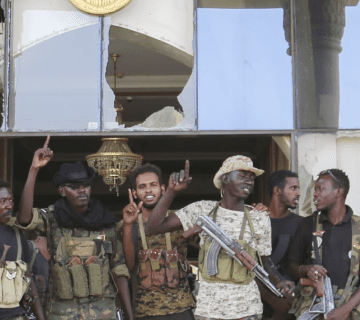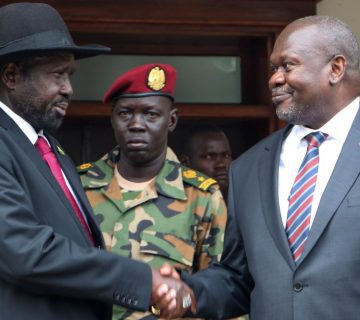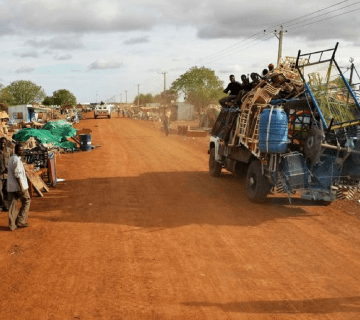Background
South Sudan’s year has been marked by a major positive development: the signing of the Revitalized Agreement on the Resolution of the Conflict in South Sudan (R-ARCSS). In December 2017, some warring parties in South Sudan, such as the President Salva Kiir led South Sudan People’s Liberation Movement (SPLM) and the Riek Machar led SPLM/Army-In Opposition, signed a ceasefire deal.This deal has, through comprehensive peace talks between December 2017 and September 2018, evolved into a power-sharing deal, which was signed by the SPLM, SPLM/A-IO, on September 12, 2018. Earlier failed peace deals in South Sudan in 2013 and 2016 reflect the reality that a peace deal does not necessarily mean that South Sudan will not relapse into violence.For example, groups like the National Salvation Front have not signed, making them potential outside spoilers to the peace deal.
The R-ARCSS is a power-sharing agreement that will see Salva Kiir continue his position of President, and Riek Machar reinstated as Vice-President. There will be four other vice-presidents, shared between other political groups. After the deal is signed, the parties will have eight months to form a transitional government (under the new format), which will hold power for 36 months. The transitional government shall hold elections 60 days before the end of the transitional period.
Scholars agree that power-sharing agreements in post-conflict situation where the population is divided along ethnic lines, and which have resulted in high casualties, do not usually hold. The London School of Hygiene and Tropical Medicine, funded by the US State Department, revealed that an estimated 383,000 people have died because of conflict in South Sudan. Half of those were killed in fighting between ethnic rivals, while the other half died from other causes, like hunger and disease, that were exacerbated by conflict.
Additionally, scholars argue that power-sharing agreements need to simultaneously incorporate four dimensions of power: political, military, economic, and territorial. The political dimension consists of the distribution of political power among the parties to the settlement. The military dimension refers to the division of power within the state’s military apparatus and its coercive instruments. The economic dimension defines the distribution of economic resources controlled or mandated by the state and positions of power in the economic sphere among parties to the agreement. Finally, the territorial dimension defines the division of autonomy between levels of government on the basis of federalism or regional autonomy arrangements.
In the case of South Sudan, these four dimension have partly been met, but comparably more emphasis has been placed on the political dimension. Sharing power among ethnic identities might entrench and institutionalize divisions in multi-ethnic societies. In particular, systems that are structured along proportionality will produce extreme rigidity, which is the case in South Sudan. On other crucial dimensions, the R-ARCSS does not provide clarity on the division of power, which might pose a problem in the future. Finally, the lack of a third-party enforcer is a crucial weakness of the agreement because parties have no insurance that if they were to lay down their arms they would not be attacked themselves. In September 2018, just one day after the signing of the R-ARCSS, government forces reportedly attacked defensive positions of opposition forces. A UN peacekeeper was shot and wounded during the assault.
The situation in South Sudan is currently volatile. In September and October 2018, Riek Machar was not Juba,because he was concerned about his safety. At the end of September 2018, President Salva Kiir appointed Reuben Malek as deputy Defence Minister. Malek has been blacklisted by the UN following alleged war crimes and crimes against humanity during his command in the Upper Nile State in 2015. Human rights defenders such as Peter BiarAjak and political prisoners remain in detention even after the government promisedto release them. In October 2018, government forces and rebel forces loyal to Machar clashed in Central Equatoria region’s Yei River State, killing a senior SPLA General. Both sides accused the other side of igniting the fight.
Despite a power-sharing agreement and a ceasefire, peace in South Sudan is still a smoke screen. South Sudan’s leaders need to show real commitment to the peace effort and set aside their differences. The economy should be revamped, and the country’s wealth should be distributed evenly throughout the country, not fall into the hands of a few corrupt officials. If South Sudan spirals into chaos once again, the country might not only risk the continuation of armed conflict, but also the introduction of other threats to peace and security, such as terrorism. Terrorist groups such as Boko Haram or al Shabab are highly efficient organizations who thrive best in chaotic situations such as northern Nigeria or Somalia. In the face of chaos and the resurrection of civil war in South Sudan, efficient terrorist organizations might become the next major threat to national and regional peace and stability by capitalizing on religious differences.



